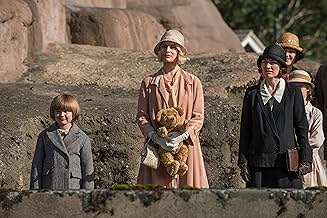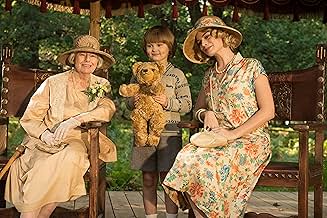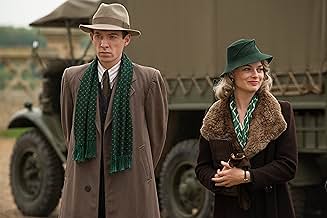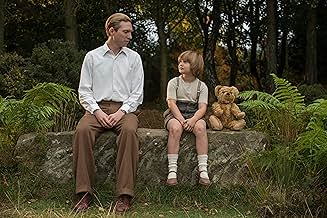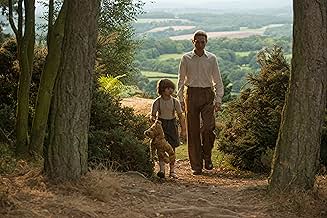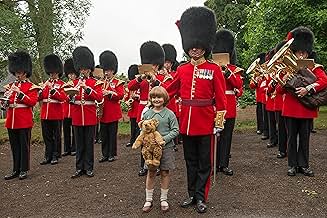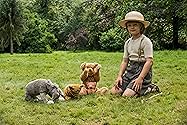Goodbye Christopher Robin
- 2017
- Tous publics
- 1h 47m
The relationship between writer AA Milne and his son, Christopher Robin, and how this became the inspiration for Winnie the Pooh.The relationship between writer AA Milne and his son, Christopher Robin, and how this became the inspiration for Winnie the Pooh.The relationship between writer AA Milne and his son, Christopher Robin, and how this became the inspiration for Winnie the Pooh.
- Director
- Writers
- Stars
- Awards
- 2 wins & 3 nominations total
- Director
- Writers
- All cast & crew
- Production, box office & more at IMDbPro
Featured reviews
Goodbye Christopher Robin certainly tugged at heartstrings, unfolding a somewhat cold narrative, sprinkled with its share of warm joyous moments of family banter and the creation of something we have all adored for the entirety of our lives. Although only rated PG, it was thematically mature in speaking to the audience as much as the characters spoke to themselves. Its power grew strongest when it beckoned the nostalgia of my childhood, telling a story as astonishingly real as I imagined Winnie the Pooh himself to be—whether it was from the books I read to the show I watched (plus the recent animated film), or my late father playing the Kenny Loggins song on guitar to my delight.
The plot may have moved somewhat slowly, but the flow of the film certainly did not. The pace of the scenes moved very fast, keeping strong engagement throughout. I'll say that it helped I am very familiar with the content material (as we all are), which kind of made it funny when you see the "origin" of a toy animal's name comes from, almost feeling contrived because we already know it... but even if this was a fictional tale with an unfamiliar background you couldn't help but be emotionally riveted. It was well acted all the way around, and we have a breakout performance by the adorable young Will Tilston.
As I said before, this film is not completely sunshine and rainbows. It does play on the idea of "in the darkness comes the light," to shine optimism on our main characters who have dealt with internal conflicts and the pains of the world wars, and to also let viewers leave not too distressed over what could have easily been told as a tale of tragedy. I think most of the right buttons were pressed for myself as I watched it, but I can't say that this is totally a children's movie where they will be riveted with joy and delight (not to mention I don't know how much influence Pooh has on children today compared to that of, say, Dora). Director Simon Curtis did this cool thing when Milne's books were being created that sometimes showed moments between young Christopher Robin and his stuffed bear literally jump off the page. Again, anything that could hearken back to my days 25 years ago were great brownie points for me.
There were only three things I did not much care for about this film. The first is the color timing. Skin tones were muddled in a red-pink hue as the entire palette had desaturated any oranges, and the only green that would appear was on the grass in the woods. Even Margot Robbie's irises lost their vivacity with every closeup of her, occurred was quite often (EDIT: after watching the trailer I see my projector may have been uncalibrated, though it still wasn't my favorite timing). The second was the way PTSD was portrayed, although this is only speaking second-hand. The certain triggers, actions, and overall attachment to the story did not really latch onto the same track as the rest of the film, even if it was authentic. Finally, the timeline jumps would be obtrusive when we have to reestablish where we are at and where we are headed. I want to say it only happened twice, but both times threw me out for a good bit.
There are enough quips in this film to provide moments of laughter, and long-drawn sequences where I notice that I was smiling the entire time. However you may be evoked throughout, by the time the credits roll the only time you couldn't hear others' waterworks was when they were overshadowed by your own. Fantastic film, and if you get a chance you owe it to yourself to see it.
The plot may have moved somewhat slowly, but the flow of the film certainly did not. The pace of the scenes moved very fast, keeping strong engagement throughout. I'll say that it helped I am very familiar with the content material (as we all are), which kind of made it funny when you see the "origin" of a toy animal's name comes from, almost feeling contrived because we already know it... but even if this was a fictional tale with an unfamiliar background you couldn't help but be emotionally riveted. It was well acted all the way around, and we have a breakout performance by the adorable young Will Tilston.
As I said before, this film is not completely sunshine and rainbows. It does play on the idea of "in the darkness comes the light," to shine optimism on our main characters who have dealt with internal conflicts and the pains of the world wars, and to also let viewers leave not too distressed over what could have easily been told as a tale of tragedy. I think most of the right buttons were pressed for myself as I watched it, but I can't say that this is totally a children's movie where they will be riveted with joy and delight (not to mention I don't know how much influence Pooh has on children today compared to that of, say, Dora). Director Simon Curtis did this cool thing when Milne's books were being created that sometimes showed moments between young Christopher Robin and his stuffed bear literally jump off the page. Again, anything that could hearken back to my days 25 years ago were great brownie points for me.
There were only three things I did not much care for about this film. The first is the color timing. Skin tones were muddled in a red-pink hue as the entire palette had desaturated any oranges, and the only green that would appear was on the grass in the woods. Even Margot Robbie's irises lost their vivacity with every closeup of her, occurred was quite often (EDIT: after watching the trailer I see my projector may have been uncalibrated, though it still wasn't my favorite timing). The second was the way PTSD was portrayed, although this is only speaking second-hand. The certain triggers, actions, and overall attachment to the story did not really latch onto the same track as the rest of the film, even if it was authentic. Finally, the timeline jumps would be obtrusive when we have to reestablish where we are at and where we are headed. I want to say it only happened twice, but both times threw me out for a good bit.
There are enough quips in this film to provide moments of laughter, and long-drawn sequences where I notice that I was smiling the entire time. However you may be evoked throughout, by the time the credits roll the only time you couldn't hear others' waterworks was when they were overshadowed by your own. Fantastic film, and if you get a chance you owe it to yourself to see it.
This a lovely film focusing on the relationship between A.A Milne and his son, Christopher Robin and how together they became sucked into the world of Winnie the Pooh.
With good performances from all this is a wonderful film, all about lost innocence and the importance of family. We are left with the question about whether Milne really did his son too many favours by placing him in a children's book after all.
Special mention must go to Will Tilston, who plays the young Christopher Robin so beautifully.
I hope this film goes onto wider acclaim, because I thought it was marvellous.
With good performances from all this is a wonderful film, all about lost innocence and the importance of family. We are left with the question about whether Milne really did his son too many favours by placing him in a children's book after all.
Special mention must go to Will Tilston, who plays the young Christopher Robin so beautifully.
I hope this film goes onto wider acclaim, because I thought it was marvellous.
Not having any serious connection with Pooh, Tigger, Piglet and the rest of the children's story, Winnie the Pooh, I am perhaps even more ready than its devotees to admire Goodbye Christopher Robin. It's a biopic of great sensitivity that mixes nostalgia for the most popular children's book ever with the harshness of two world wars and the practice of parents leaving their children with nannies in the first quarter of the 20th century.
I now wish I had a stronger relationship with those little critters and that lovable boy, for I could have used the distraction from the aftermath of WWII just as Pooh was able to do for the world after the war to end all wars. Author A.A. Milne (a stoic and yet lovable Domhnall Gleeson) was traumatized by his service in the war, and moved slowly to erase that PTSD while creating Pooh. The film spends too much time on his trauma, but it does help fill out Milne's character.
Yet, this is the story of Billy Moon (a remarkably-dimpled, serene Will Tilston), as Christopher Robin is called in real life, who supplies his dad with inspirations for the book. The film centers on remote dad's growing love for the boy and the book while remote mom goes off to London to do who knows what. The film carefully shows how children might be lucky to have a nanny like Neu (Kelly Macdonald) to give them love and some creative inspiration along the way.
Goodbye Christopher Robin is a successful biopic because it doesn't spare the story of anti-helicopter parents who endanger the mental health of their children with their absences. As fame overtakes the Milne family, the film still relays the sense of wonderment Billy had as a child immersed in love of his forest, animals, and imagination.
The biopic may be counter to what we expected of a world-renowned author of a book for children. That he had difficulty initially interacting with his own child is unusual, but the film is successful showing how he warms up and creates a masterpiece as well.
Though not always a feel good movie, Goodbye Christopher Robin makes you wish he'd never go away. It looks like he never will.
I now wish I had a stronger relationship with those little critters and that lovable boy, for I could have used the distraction from the aftermath of WWII just as Pooh was able to do for the world after the war to end all wars. Author A.A. Milne (a stoic and yet lovable Domhnall Gleeson) was traumatized by his service in the war, and moved slowly to erase that PTSD while creating Pooh. The film spends too much time on his trauma, but it does help fill out Milne's character.
Yet, this is the story of Billy Moon (a remarkably-dimpled, serene Will Tilston), as Christopher Robin is called in real life, who supplies his dad with inspirations for the book. The film centers on remote dad's growing love for the boy and the book while remote mom goes off to London to do who knows what. The film carefully shows how children might be lucky to have a nanny like Neu (Kelly Macdonald) to give them love and some creative inspiration along the way.
Goodbye Christopher Robin is a successful biopic because it doesn't spare the story of anti-helicopter parents who endanger the mental health of their children with their absences. As fame overtakes the Milne family, the film still relays the sense of wonderment Billy had as a child immersed in love of his forest, animals, and imagination.
The biopic may be counter to what we expected of a world-renowned author of a book for children. That he had difficulty initially interacting with his own child is unusual, but the film is successful showing how he warms up and creates a masterpiece as well.
Though not always a feel good movie, Goodbye Christopher Robin makes you wish he'd never go away. It looks like he never will.
While not entirely perfect, this film is one that I will definitely watch again.
It had strange resonances for me personally, as my grandmother was a famous and celebrated author, who used me as inspiration for several of her children's books, and also as a subject for one of her academic books for adults.
During my early childhood, I spent many happy days playing imaginative games with my grandmother - always followed around by a photographer - and those games became the basis for her stories, with the photographs of me used to illustrate them. At the time I was quite happy about this, as it made me feel special, but I am now very well aware that I was being exploited.
Like Christopher Robin, I was never asked permission to be in her books, nor was I ever paid (although I inherited a modest amount of money when she died, so I suppose that could be considered payment of sorts).
Unlike Christopher Robin, I never resented the books I was in, and I never felt that my childhood memories had been stolen or commercialised. But my situation was never as drastic as his, and my grandmother's celebrity didn't even come close to that of A.A. Milne. However, there are enough parallels to have given me a few shivers while watching this movie.
Others have commented on its excellence, so I won't belabour that point, except to say that I agree. As a film it is beautifully crafted and (for me anyway) endlessly re-watchable.
I disagree with the negative comments about the stilted acting. If anything I felt they needed to be more stilted to be properly true to the period. I do agree that Margo Robbie's accent was uneven, but performance-wise I felt she did very well in what was perhaps the hardest role to perform convincingly.
As others have mentioned, the best performances came from the two boys playing Christopher Robin, although I also particularly liked Stephen Campbell Moore's understated warmth, and - for the first time in her career- I actually found myself liking Kelly Macdonald, an actress who has irritated me in every other film in which I've seen her. Here she exudes warmth and tenderness, and in a well-pitched and technically difficult performance manages to display undercurrents of disapproval and sympathy to the audience without over-egging the pudding.
The cinematography by Ben Smithard also bears special mention, bringing to the screen a subtle yet richly evocative atmosphere of nostalgia and childhood innocence without sacrificing realism or becoming overly stylised.
In fact, one of this film's many technical merits is the fine balance it achieves between all its various flavours and ingredients; each one subtle and understated, yet combining to create a rich and satisfying whole.
As an overall viewing experience it has much to recommend it, and very little about which to complain.
It had strange resonances for me personally, as my grandmother was a famous and celebrated author, who used me as inspiration for several of her children's books, and also as a subject for one of her academic books for adults.
During my early childhood, I spent many happy days playing imaginative games with my grandmother - always followed around by a photographer - and those games became the basis for her stories, with the photographs of me used to illustrate them. At the time I was quite happy about this, as it made me feel special, but I am now very well aware that I was being exploited.
Like Christopher Robin, I was never asked permission to be in her books, nor was I ever paid (although I inherited a modest amount of money when she died, so I suppose that could be considered payment of sorts).
Unlike Christopher Robin, I never resented the books I was in, and I never felt that my childhood memories had been stolen or commercialised. But my situation was never as drastic as his, and my grandmother's celebrity didn't even come close to that of A.A. Milne. However, there are enough parallels to have given me a few shivers while watching this movie.
Others have commented on its excellence, so I won't belabour that point, except to say that I agree. As a film it is beautifully crafted and (for me anyway) endlessly re-watchable.
I disagree with the negative comments about the stilted acting. If anything I felt they needed to be more stilted to be properly true to the period. I do agree that Margo Robbie's accent was uneven, but performance-wise I felt she did very well in what was perhaps the hardest role to perform convincingly.
As others have mentioned, the best performances came from the two boys playing Christopher Robin, although I also particularly liked Stephen Campbell Moore's understated warmth, and - for the first time in her career- I actually found myself liking Kelly Macdonald, an actress who has irritated me in every other film in which I've seen her. Here she exudes warmth and tenderness, and in a well-pitched and technically difficult performance manages to display undercurrents of disapproval and sympathy to the audience without over-egging the pudding.
The cinematography by Ben Smithard also bears special mention, bringing to the screen a subtle yet richly evocative atmosphere of nostalgia and childhood innocence without sacrificing realism or becoming overly stylised.
In fact, one of this film's many technical merits is the fine balance it achieves between all its various flavours and ingredients; each one subtle and understated, yet combining to create a rich and satisfying whole.
As an overall viewing experience it has much to recommend it, and very little about which to complain.
REVIEW - GOODBYE CHRISTOPHER ROBIN
Honestly didn't know what to expect when I went to see this film. As its based (loosely) around the creation of the Winnie The Poo stories I thought it was going to be a children's film but.......
The film itself is actually and surprising very good, touching on the family dynamic of the upper classes during the 1930s to 1940s.
Very stand offish parents who seem to care about their social standing rather than their son (Christopher Robin) and how this impacts on all of their lives.
Looking at how one person can force the hand of another, in this case forcing father and son to actually spend time together and bond.
Lessons can be learnt from this film, no matter how much you work, your children want you.
Thoroughly enjoyable film on many levels.
Rating 10 out of 10
Honestly didn't know what to expect when I went to see this film. As its based (loosely) around the creation of the Winnie The Poo stories I thought it was going to be a children's film but.......
The film itself is actually and surprising very good, touching on the family dynamic of the upper classes during the 1930s to 1940s.
Very stand offish parents who seem to care about their social standing rather than their son (Christopher Robin) and how this impacts on all of their lives.
Looking at how one person can force the hand of another, in this case forcing father and son to actually spend time together and bond.
Lessons can be learnt from this film, no matter how much you work, your children want you.
Thoroughly enjoyable film on many levels.
Rating 10 out of 10
Did you know
- TriviaThe film's depiction of C.R. Milne's relationship with his parents is relatively accurate. The actual C.R. never forgave his father for exploiting him (perhaps inadvertently) to sell books. Instead, he learned to accept what had happened and lived with it until he died in 1996. His relationship with his mother was worse; she disapproved of C.R. marrying his cousin. After A.A. Milne died in 1956, C.R. had almost no contact with his mother until she died fifteen years later. C.R.'s only child, his daughter Claire, was born with cerebral palsy. She died in 2012 at age 56.
- GoofsWhen the Guards band are playing, several are wearing modern day medals (Iraq, Afghanistan etc.). The close up of the cymbal player shows the Queen's Golden and Diamond Jubilee Medal which weren't awarded till 2002 and 2012, alongside a LSGC with Queen Elizabeth II on it.
- Quotes
Daphne Milne: You know what writing a book against war is like? It's like writing a book against Wednesdays. Wednesdays... are a fact of life, and if you don't like them, you could just stay in bed, but you can't stop them because Wednesdays are coming and if today isn't actually a Wednesday it soon will be.
- ConnectionsFeatured in Box Office: Episode dated 28 September 2017 (2017)
- Soundtracks2 Waltzes, Op. 54: Waltz No. 1: Moderato in A Major
Written by Antonín Dvorák
Performed by Vlach Quartet Prague
Courtesy of Naxos Rights US Inc.
- How long is Goodbye Christopher Robin?Powered by Alexa
Details
- Release date
- Countries of origin
- Official sites
- Language
- Also known as
- Hasta pronto, Christopher Robin
- Filming locations
- Gills Lap, Ashdown Forest, East Sussex, England, UK(Forest Scenes)
- Production companies
- See more company credits at IMDbPro
Box office
- Gross US & Canada
- $1,735,251
- Opening weekend US & Canada
- $57,917
- Oct 15, 2017
- Gross worldwide
- $7,401,949
- Runtime1 hour 47 minutes
- Color
- Sound mix
- Aspect ratio
- 1.85 : 1
Contribute to this page
Suggest an edit or add missing content








